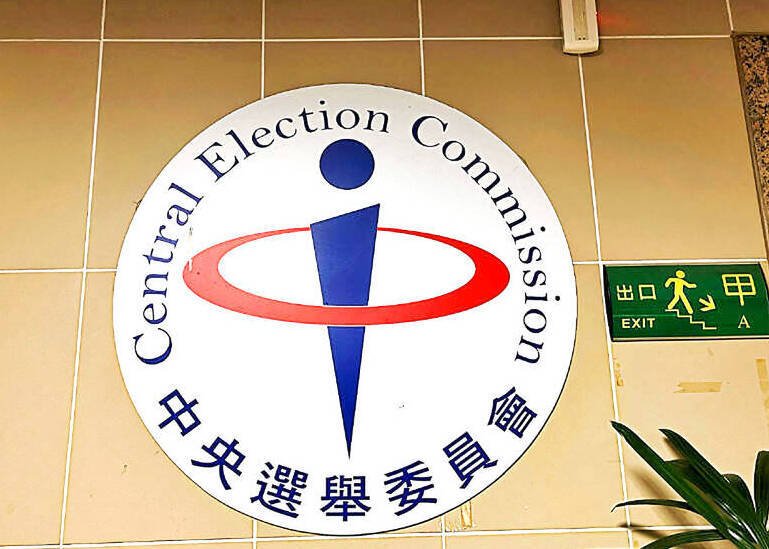The Central Election Commission (CEC) yesterday approved one of two public referendum questions proposed by opposition lawmakers in the Legislature Yuan, but was harshly criticized by the opposition for rejecting the other proposal.
The submission that was approved was a question on whether the Maanshan Nuclear Power Plant should resume operations, provided it is deemed safe by the relevant authorities. The vote is scheduled for Aug. 23, 2025.
The rejected proposal asked whether judges should be allowed to impose the death penalty without a unanimous verdict.

Photo: Lee Wen-hsin, Taipei Times
According to the CEC, that proposal was not allowed because it contradicted a constitutional court ruling in 2024 requiring unanimous decisions for death sentences.
In addition, the proposal does not qualify as a major policy issue under the Referendum Act (公民投票法), the CEC said in a statement.
Referendums initiated by the Legislature must follow the Referendum Act and can only address the creation or repeal of major policies, the agency said.
The death penalty proposal, it said, was deemed to be an attempt to change fundamental legal principles, which is outside the legal scope of referendums.
In contrast, the nuclear energy proposal deals with energy policy and fits within the rules for referendums. The plant stopped operating on May 17, and the vote will decide whether it can restart.
The referendum will be held nationwide on Aug. 23, from 8 am to 4 pm, and will be listed as Referendum Case No. 21, the CEC said.
The CEC insisted that it is an independent body that must ensure all referendum proposals follow the law, even when submitted by the Legislature.
In response, the Chinese Nationalist Party (KMT) condemned the CEC for rejecting the proposed referendum on the death penalty, accusing the commission of “acting unlawfully and serving as a political tool.”
In a statement, the KMT caucus said the Referendum Act does not grant the CEC or other administrative bodies the power to conduct “politically motivated reviews of proposals” submitted by the Legislative Yuan, calling the decision a “blatant abuse of power.”

CHAOS: Iranians took to the streets playing celebratory music after reports of Khamenei’s death on Saturday, while mourners also gathered in Tehran yesterday Iranian Supreme Leader Ayatollah Ali Khamenei was killed in a major attack on Iran launched by Israel and the US, throwing the future of the Islamic republic into doubt and raising the risk of regional instability. Iranian state television and the state-run IRNA news agency announced the 86-year-old’s death early yesterday. US President Donald Trump said it gave Iranians their “greatest chance” to “take back” their country. The announcements came after a joint US and Israeli aerial bombardment that targeted Iranian military and governmental sites. Trump said the “heavy and pinpoint bombing” would continue through the week or as long

TRUST: The KMT said it respected the US’ timing and considerations, and hoped it would continue to honor its commitments to helping Taiwan bolster its defenses and deterrence US President Donald Trump is delaying a multibillion-dollar arms sale to Taiwan to ensure his visit to Beijing is successful, a New York Times report said. The weapons sales package has stalled in the US Department of State, the report said, citing US officials it did not identify. The White House has told agencies not to push forward ahead of Trump’s meeting with Chinese President Xi Jinping (習近平), it said. The two last month held a phone call to discuss trade and geopolitical flashpoints ahead of the summit. Xi raised the Taiwan issue and urged the US to handle arms sales to

BIG SPENDERS: Foreign investors bought the most Taiwan equities since 2005, signaling confidence that an AI boom would continue to benefit chipmakers Taiwan Semiconductor Manufacturing Co’s (TSMC, 台積電) market capitalization swelled to US$2 trillion for the first time following a 4.25 percent rally in its American depositary receipts (ADR) overnight, putting the world’s biggest contract chipmaker sixth on the list of the world’s biggest companies by market capitalization, just behind Amazon.com Inc. The site CompaniesMarketcap.com ranked TSMC ahead of Saudi Aramco and Meta Platforms Inc. The Taiwanese company’s ADRs on Tuesday surged to US$385.75 on the New York Stock Exchange, as strong demand for artificial intelligence (AI) applications led to chip supply constraints and boost revenue growth to record-breaking levels. Each TSMC ADR represents

Pro-democracy media tycoon Jimmy Lai’s (黎智英) fraud conviction and prison sentence were yesterday overturned by a Hong Kong court, in a surprise legal decision that comes soon after Lai was jailed for 20 years on a separate national security charge. Judges Jeremy Poon (潘兆初), Anthea Pang (彭寶琴) and Derek Pang (彭偉昌) said in the judgement that they allowed the appeal from Lai, and another defendant in the case, to proceed, as a lower court judge had “erred.” “The Court of Appeal gave them leave to appeal against their conviction, allowed their appeals, quashed the convictions and set aside the sentences,” the judges